Unit 12 What did you do last weekend 第3课时考点讲解+writing(22张PPT)
文档属性
| 名称 | Unit 12 What did you do last weekend 第3课时考点讲解+writing(22张PPT) |  | |
| 格式 | pptx | ||
| 文件大小 | 2.3MB | ||
| 资源类型 | 试卷 | ||
| 版本资源 | 人教新目标(Go for it)版 | ||
| 科目 | 英语 | ||
| 更新时间 | 2021-07-20 14:24:44 | ||
图片预览

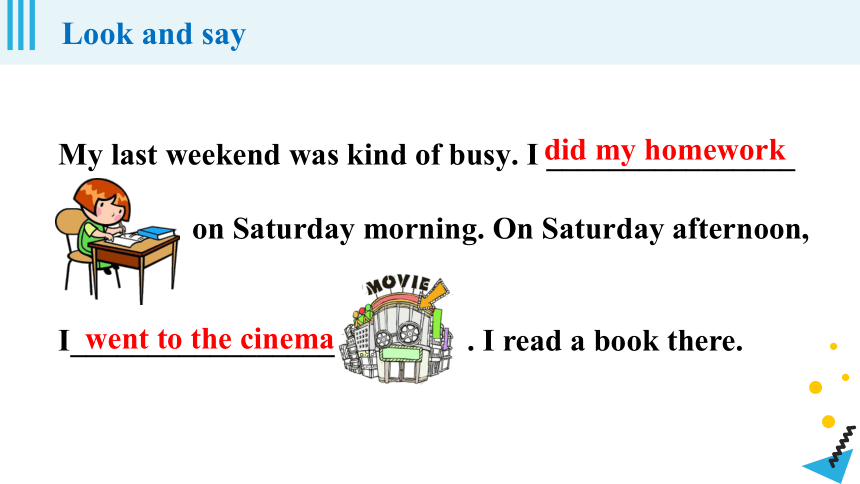
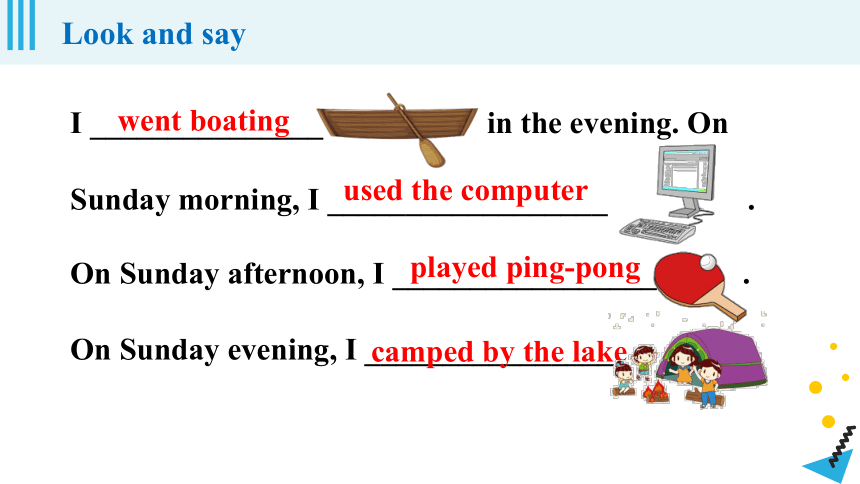
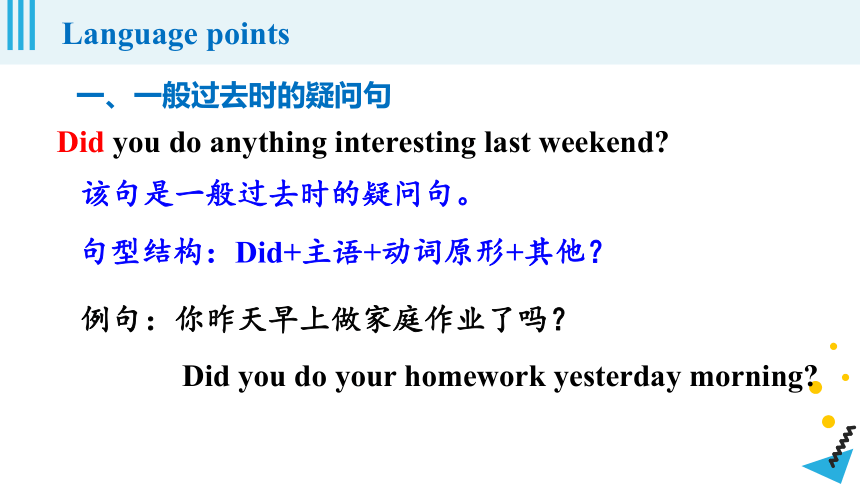
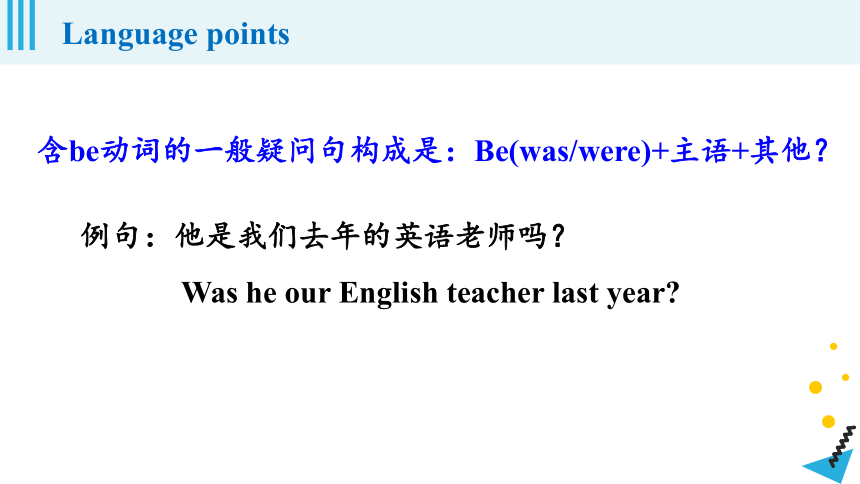
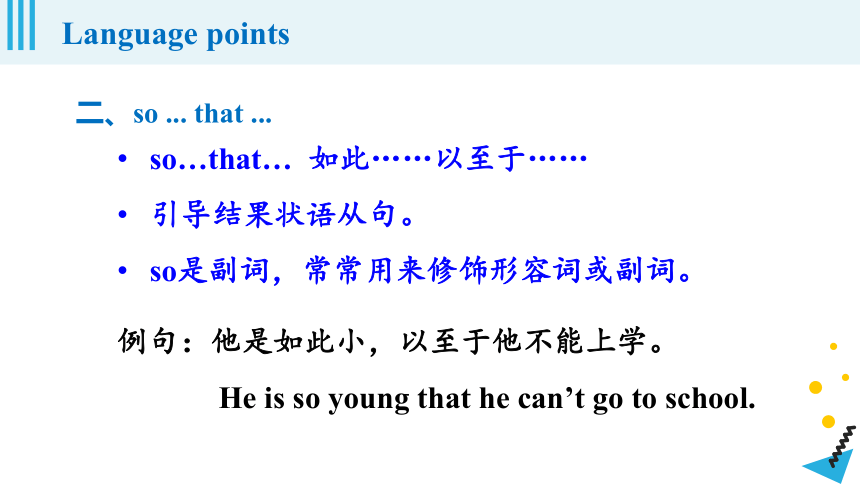
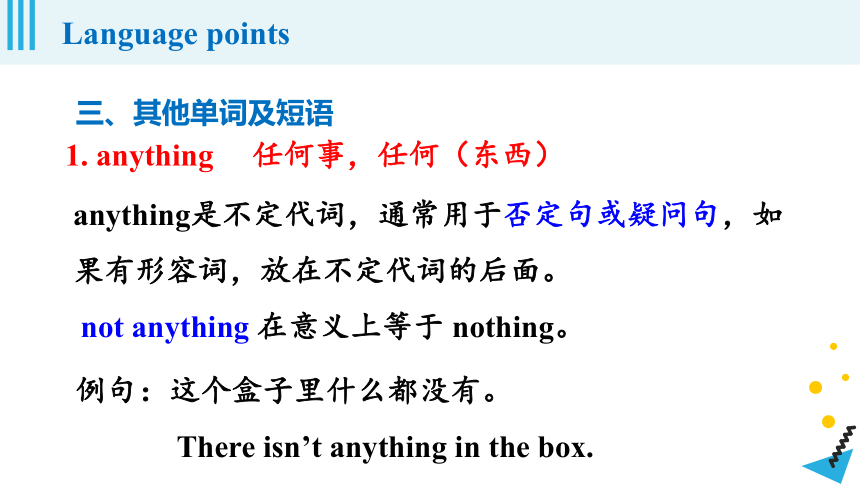
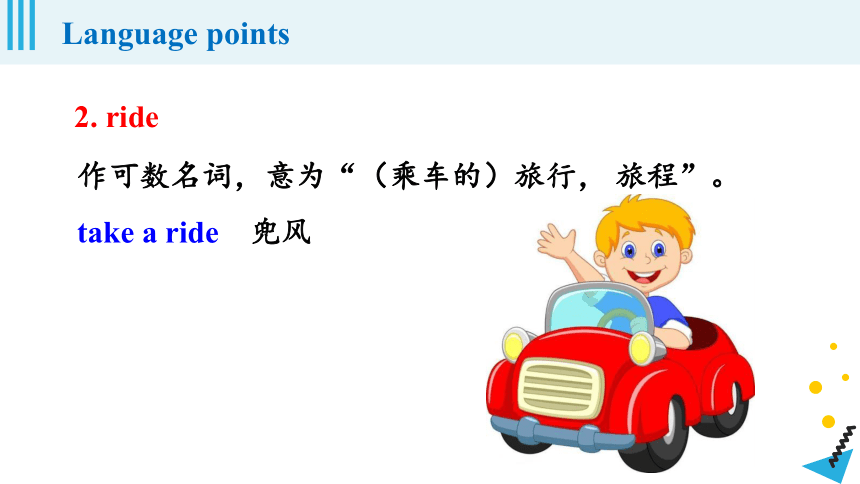
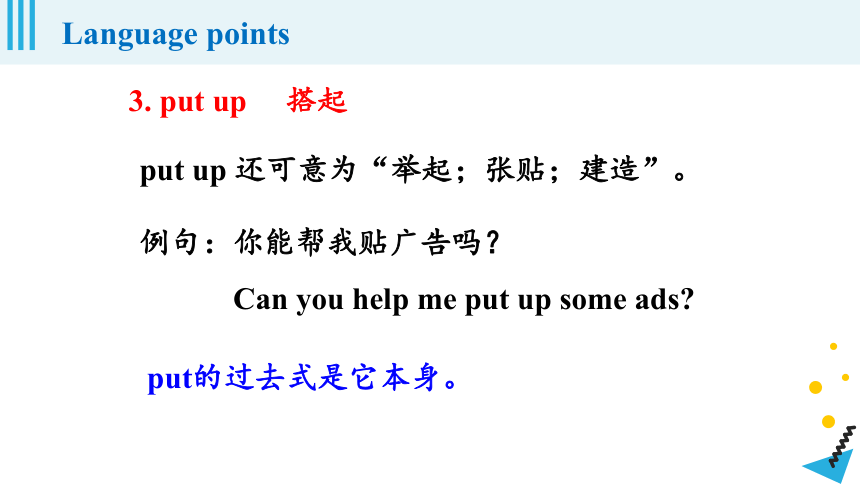
文档简介
Unit 12 What did you do last weekend?
R 七年级下册
第三课时
Look and say
My last weekend was kind of busy. I ________________
on Saturday morning. On Saturday afternoon,
I_________________ . I read a book there.
did my homework
went to the cinema
Look and say
I _______________ in the evening. On
Sunday morning, I __________________ .
On Sunday afternoon, I _________________ .
On Sunday evening, I ________________ .
went boating
used the computer
played ping-pong
camped by the lake
Language points
Did you do anything interesting last weekend?
该句是一般过去时的疑问句。
例句:你昨天早上做家庭作业了吗?
Did you do your homework yesterday morning?
句型结构:Did+主语+动词原形+其他?
一、一般过去时的疑问句
Language points
含be动词的一般疑问句构成是:Be(was/were)+主语+其他?
例句:他是我们去年的英语老师吗?
Was he our English teacher last year?
Language points
so…that… 如此……以至于……
引导结果状语从句。
so是副词,常常用来修饰形容词或副词。
例句:他是如此小,以至于他不能上学。
He is so young that he can’t go to school.
二、so ... that ...
Language points
anything是不定代词,通常用于否定句或疑问句,如果有形容词,放在不定代词的后面。
not anything 在意义上等于 nothing。
1. anything 任何事,任何(东西)
例句:这个盒子里什么都没有。
There isn’t anything in the box.
三、其他单词及短语
Language points
2. ride
作可数名词,意为“(乘车的)旅行, 旅程”。
take a ride 兜风
Language points
put up 还可意为“举起;张贴;建造”。
3. put up 搭起
例句:你能帮我贴广告吗?
Can you help me put up some ads?
put的过去式是它本身。
Language points
put off 推迟;脱掉
put out 扑灭;赶走
put on 穿上
Language points
4. on the first night 在头一天夜里
on the first night 表示“在具体某一天的上午、下午或晚上”等时间,常用介词on。
in the morning in the afternoon
in the evening at night
Language points
英语中each other为代词,在及物动词之后可直接用作宾语;而在不及物动词之后,则要借助介词。
例句:我们互相学习。
We learn from each other.
5. each other=one another
Language points
6. look out of 向……外看
out of 为动态介词,表示“从……里面向外”。
look out 有“当心;小心”的意思。
例句:Look out! Here comes the car.
小心!汽车来了。
反义词:into
Language points
7. When we looked out of our tent, we saw a big
snake sleeping near the fire.
see sb. doing sth. 看见某人正在做某事
see sb. do sth. 看见某人做(了)某事
表示看见某人做某事的全过程。
类似的词:hear, watch, feel等,具有相同的用法。
Language points
1. get a surprise 吃惊
surprise为可数名词,意为“惊奇;惊讶”。
例句:当我再次见到她时我吃了一惊。
I got a surprise when I met her again.
四、惊讶的表达
Language points
2. surprise
作名词时,意为“惊奇,惊讶”。
作动词时,意为“使吃惊”。
You surprise me.
Language points
为形容词,意为“感到吃惊的”,
主语通常是人。
3. surprised
She is surprised.
Language points
为形容词,意为“令人吃惊的”,通常修饰物。
4. surprising
It is surprising that there is so much food.
Practice
1. The boy got a ___ when he saw his father.
A. surprising B. surprised
C. surprise D. more surprised
2. I saw him ______ basketball when I found my mom.
A. play B. playing C. plays D. played
Practice
3. —Excuse me,is there _______ in today’s newspaper?
—No, nothing.
A. something new
B. new something
C. anything new
Class summary
Unit 12 What did you do last weekend?
1. I was so tired that I went to sleep early.
2.We saw a big snake sleeping near the fire.
3.My dad told me later that snakes don\'t have ears but can feel things moving.
Thank you!
R 七年级下册
第三课时
Look and say
My last weekend was kind of busy. I ________________
on Saturday morning. On Saturday afternoon,
I_________________ . I read a book there.
did my homework
went to the cinema
Look and say
I _______________ in the evening. On
Sunday morning, I __________________ .
On Sunday afternoon, I _________________ .
On Sunday evening, I ________________ .
went boating
used the computer
played ping-pong
camped by the lake
Language points
Did you do anything interesting last weekend?
该句是一般过去时的疑问句。
例句:你昨天早上做家庭作业了吗?
Did you do your homework yesterday morning?
句型结构:Did+主语+动词原形+其他?
一、一般过去时的疑问句
Language points
含be动词的一般疑问句构成是:Be(was/were)+主语+其他?
例句:他是我们去年的英语老师吗?
Was he our English teacher last year?
Language points
so…that… 如此……以至于……
引导结果状语从句。
so是副词,常常用来修饰形容词或副词。
例句:他是如此小,以至于他不能上学。
He is so young that he can’t go to school.
二、so ... that ...
Language points
anything是不定代词,通常用于否定句或疑问句,如果有形容词,放在不定代词的后面。
not anything 在意义上等于 nothing。
1. anything 任何事,任何(东西)
例句:这个盒子里什么都没有。
There isn’t anything in the box.
三、其他单词及短语
Language points
2. ride
作可数名词,意为“(乘车的)旅行, 旅程”。
take a ride 兜风
Language points
put up 还可意为“举起;张贴;建造”。
3. put up 搭起
例句:你能帮我贴广告吗?
Can you help me put up some ads?
put的过去式是它本身。
Language points
put off 推迟;脱掉
put out 扑灭;赶走
put on 穿上
Language points
4. on the first night 在头一天夜里
on the first night 表示“在具体某一天的上午、下午或晚上”等时间,常用介词on。
in the morning in the afternoon
in the evening at night
Language points
英语中each other为代词,在及物动词之后可直接用作宾语;而在不及物动词之后,则要借助介词。
例句:我们互相学习。
We learn from each other.
5. each other=one another
Language points
6. look out of 向……外看
out of 为动态介词,表示“从……里面向外”。
look out 有“当心;小心”的意思。
例句:Look out! Here comes the car.
小心!汽车来了。
反义词:into
Language points
7. When we looked out of our tent, we saw a big
snake sleeping near the fire.
see sb. doing sth. 看见某人正在做某事
see sb. do sth. 看见某人做(了)某事
表示看见某人做某事的全过程。
类似的词:hear, watch, feel等,具有相同的用法。
Language points
1. get a surprise 吃惊
surprise为可数名词,意为“惊奇;惊讶”。
例句:当我再次见到她时我吃了一惊。
I got a surprise when I met her again.
四、惊讶的表达
Language points
2. surprise
作名词时,意为“惊奇,惊讶”。
作动词时,意为“使吃惊”。
You surprise me.
Language points
为形容词,意为“感到吃惊的”,
主语通常是人。
3. surprised
She is surprised.
Language points
为形容词,意为“令人吃惊的”,通常修饰物。
4. surprising
It is surprising that there is so much food.
Practice
1. The boy got a ___ when he saw his father.
A. surprising B. surprised
C. surprise D. more surprised
2. I saw him ______ basketball when I found my mom.
A. play B. playing C. plays D. played
Practice
3. —Excuse me,is there _______ in today’s newspaper?
—No, nothing.
A. something new
B. new something
C. anything new
Class summary
Unit 12 What did you do last weekend?
1. I was so tired that I went to sleep early.
2.We saw a big snake sleeping near the fire.
3.My dad told me later that snakes don\'t have ears but can feel things moving.
Thank you!
同课章节目录
- Unit 1 Can you play the guitar?
- Section A
- Section B
- Unit 2 What time do you go to school?
- Section A
- Section B
- Unit 3 How do you get to school?
- Section A
- Section B
- Unit 4 Don't eat in class.
- Section A
- Section B
- Unit 5 Why do you like pandas?
- Section A
- Section B
- Unit 6 I'm watching TV.
- Section A
- Section B
- Review of Units 1-6
- Unit 7 It's raining!
- Section A
- Section B
- Unit 8 Is there a post office near here?
- Section A
- Section B
- Unit 9 What does he look like?
- Section A
- Section B
- Unit 10 I'd like some noodles.
- Section A
- Section B
- Unit 11 How was your school trip?
- Section A
- Section B
- Unit 12 What did you do last weekend?
- Section A
- Section B
